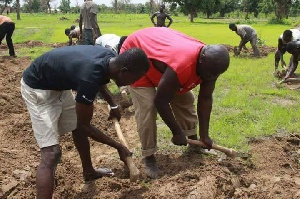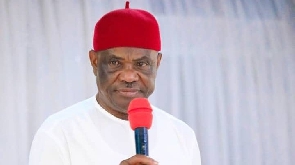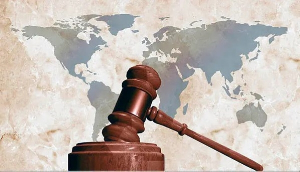Head of Economic Division at the Institute of Statistical, Social and Economic Research (ISSER), Dr. Charles Ackah, has observed that until government turns its focus on agriculture and manufacturing, it will never achieve the kind of development the country needs.
According to him, Ghana’s oil find cannot be the saviour of a buoyant economy, given that it is subjected to the volatility of world market prices which is mostly falling.
“Basing most of the country’s budget on oil revenue may fail you. That is why the Minister for Finance had to go back to parliament for approval of a supplementary budget when the oil price sharply declined”, the Economic analyst said in an interview after ISSER’s 25th presentation on the State of the Ghanaian Economy Report, 2015.
The report showed that Ghana recorded a high Gross Domestic Product (GDP) of 14 percent in 2011 when it started exploring oil in commercial value for the world market, but that could be sustained in the subsequent years, with a continuing decline to 4.0 percent in 2014 and 3.9 percent in 2015.
Surprisingly, the 2015, non-oil GDP growth was 4.1 percent while an overall GDP growth was 3.9 percent, indicating that for the first time since 2011, non-oil GDP growth has out spaced total GDP growth.
ISSER’s report, again, showed that the service sector remained the main driver in 2015 with a growth rate of 5.7 percent, followed by industry, the second largest sector, at 1.2 percent and finally by agriculture at 2.4 percent.
But Dr. Ackah, told this reporter that agriculture and manufacturing sectors are supposed to be the backbone of the economy with the service sector as a backing.
In his view, the country should invest in agriculture colleges as well as Science and technology colleges to make agriculture very productive to result in exporting more products.
Dr. Ackah, explained that Ghana needs to add value to cocoa, timber as well as the other cash crops in order to insure the country against world market volatility that is why manufacturing will also need a special focus.
To achieve that, the economist suggested government creates policies where it will be willing to invest in science and technology training schools and also, be willing to give scholarships to interested students to power the agriculture and manufacturing in the country.
Painting a picture of the economy, Dr. Ackah indicated that the economy was weakly recovering from its worst performance since 2011 at 3.9 percent GDP growth.
However, he does not expect anything different in the figures of 2016, since it is election year and thus it is possible for government to over spend its budget, which by next year will result in high deficit and inflation, proceeding to affect the exchange rate.
He acknowledged that the contractions in the economy has resulted in the struggle of businesses for survival, high electricity bills and high unemployment rate.
The Economist therefore cautioned government to cut back on spending and develop the agriculture sector to drive the economy back to one which is not dependent on borrowing, begging from international donors or ride on the back of oil revenue and the service sector.
“The economy has to be diversified and buoyant. That is how we are going to develop as a nation”, he underscored.
Business News of Wednesday, 28 September 2016
Source: Myradio360
Focus on Agric for real development - Dr. Ackah to Gov't
Entertainment












